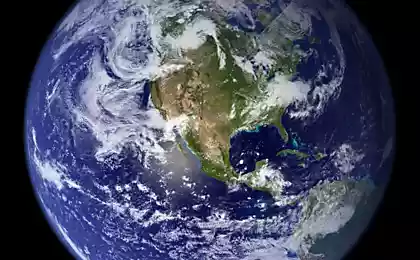422
The essence of the overpopulation of the Earth
The second half of the sixties of the twentieth century was the heyday of the nightmare theories about what awaits humanity in the future. For example, in 1966, the science fiction writer Harry Harrison wrote a novel, "Move over! Move over!". This book is about a dystopian world where too many people competed for too few resources, became the basis for the 1973 film about our hellish future, "soylent Green". In 1969, the pop Duo Zager and Evans reached the top of the charts with the song "In the year 2525" in which it was assumed that people are rapidly moving towards their own destruction.
In this area there was no man more influential — or more terrifying, some would say — what Paul R. Ehrlich, a biologist from Stanford University. It published in 1968 book "the Population bomb" sold millions of copies of bitter complaints about the fact that humanity is on the brink of Apocalypse because of their excessive number. Dr. Ehrlich began with a claim that can be considered the verbal equivalent of punch in the stomach: "the Battle to feed all of humanity, came to an end." He further predicted that hundreds of millions of people will die of starvation in the 1970s, that 65 million of them will be Americans that India is overpopulated was, in fact, doomed, that there is a high probability that "Britain will cease to exist by 2000". Dr. Ehrlich was so confident in his words, in 1970, warned: "over the next 15 years will come to an end." By "end" he meant "the utter collapse of the ability of the planet to support humanity."
As you can see, England is still with us. Like India. Hundreds of millions died from famine in the 70's. Humanity has managed to survive, although now the population of the planet exceeds 7 billion people, twice more than in the time when "the Population bomb" became a bestseller, and its author — a frequent guest of Jimmy Carson on "The Tonight Show".
Ninety nine million six hundred seventy thousand two hundred seventy three
After 47 years, Dr. Ehrlich is not particularly eager to admit his mistake. Even vice versa. The time frame of the disasters of the sort that he once offered, have no meaning, he told Retro Report, because someone from his area of work, they mean "totally, completely", that for the average person. The end is still close, says the scientist, without abandoning his claim made in the sixties and saying that population must be controlled, preferably voluntary methods. But if you see the need, he said, Ehrlich would support "various forms of coercion", such as "the abolition of tax exemptions for large families." Allow women to have as many children as they want, according to a scientist, tantamount to allow anyone to "throw in the neighbour's yard of any debris."
Ominous statement of Dr. Ehrlich cause shame and frustration of some of his former allies — the people who forty years ago who shared fears about overpopulation. One of them is Stewart Brand, founder and editor of Whole Earth Catalog. In regard to this topic of Brand can be called a Keynesian in the spirit of observation, often attributed to John Maynard Keynes: "If the facts change, my opinion changes too, sir. What about you?"Brand formulated for Retro Report their opinion in the form of a question: "How many years the end of the world should not come, you come to the decision that he probably does not occur, because the reasons were wrong?»
In what happened while we tried to destruction — opening human way to feed themselves, despite the growing population. For this have largely to thank Norman barloga, American botanist, who brought a very productive and disease resistant culture that saved agriculture. This event is known as the Green Revolution. Although the lack of food in some regions, often it is the result rather the failure of the state, corruption and civil conflict than complete lack of food.
Some unusually optimistic analysts have concluded that people will always be able to find a way out of a difficult situation. Among them were Julian L. Simon, an economist, as an example the anti-Ehrlich, arguing that "the condition of humanity will improve almost any material terms". In 1997, a year before his death, Simon in an interview with Wired magazine suggested that "no matter how fast growing population, historically food production has always increased at least at the same rate, if not faster."
Somewhere between a pessimist and an optimist Ehrlich Simon is Fred Pearce, a British author specializing in the subject of world population. It is not concerned that the world is too many people. In fact, the birth rate is now below, or nearly below their long-term reproductive level around the world — not only in the developed countries of the West and Japan but also in India, China, much of South-East Asia, Latin America, i.e. almost everywhere, except Africa, although there is level on the continent is decreasing. "Unborn girls will become mothers," writes Pearce in his book "the Coming demographic collapse and the unexpected future of our planet" published by Beacon Press in 2010.
Twenty two million five hundred fifty two thousand sixty five
Due to the increased level of health to give birth to many children — not the mandatory way to continue the race as before. In crowded cities large families are not so contented as in the past the village. And in many cultures women are becoming more independent in social and economic terms. They don't agree with the fact that their destiny is to be eternally pregnant. If it is about something and worrying in some countries, it is likely that their populations are ageing and the outflow of the life force of the nation.
However, many assure us that the world population will continue to grow. But how long will it last? Hell of a question. The oft-quoted demographic model UN involves debatability peak around 2050. Others predict continued growth in the next century. Third — that the population will decline until the middle of this century. The numbers become more deceptive, one need only look at population density. It is generally believed that too many people in a small area is a recipe to poverty and other social ills. However, according to the UN, the first three places the population density is Monaco, Macau and Singapore. In none of these countries disasters does not even smell.
According to Pierce, the evil lies not in overpopulation and overconsumption. "We can survive a major demographic shift," he encouraged us in 2011. But he is not so optimistic in relation to excessive use of available resources and its impact on climate (although the anxiety over the state of the world can become a motivator of finding a solution, as fears about demography could help to defuse the population bomb).
"Consumption growth today is much superior to the growth in the number of people as a threat to the planet," wrote Pearce in the British magazine Prospect in 2010. "And most of the excessive consumption is in the rich countries that have long ceased to significantly improve in the population, while a large part of other population growth occurs in countries with very weak impact on the planet»
"Let's look at carbon dioxide emissions, the largest at the moment, the threat posed by climate. The richest half a billion people, and that around 7% of the world population, are responsible for half the world's carbon dioxide emissions. At the same time, the poorest 50% in response to just 7% of emissions."
Some degree of anxiety about crowded planet came out of the international discourse. Pierce believes that they were forced out by global warming and similar problems. The phrase "zero population growth" once the battle cry of the movement, and now heard infrequently. In our paper, for example, it is in the last seven years was found in only three articles.
But Dr. Ehrlich, who is also 83 years old, refuses his gloomy predictions. He admits he would not repeat all that once wrote. But at that time his main task was to draw public attention to a threatening situation, and this he did. Scientist still believe that death is not far off and will not have to wait until 2525 years or longer. What he wrote in the sixties, according to him, it was still soft. Ehrlich says Retro Report: "Today, my style would be even apocaliptica than then." published
P. S. And remember, only by changing their consumption — together we change the world! ©
Source: smoozi.ru/science/many_people.html
In this area there was no man more influential — or more terrifying, some would say — what Paul R. Ehrlich, a biologist from Stanford University. It published in 1968 book "the Population bomb" sold millions of copies of bitter complaints about the fact that humanity is on the brink of Apocalypse because of their excessive number. Dr. Ehrlich began with a claim that can be considered the verbal equivalent of punch in the stomach: "the Battle to feed all of humanity, came to an end." He further predicted that hundreds of millions of people will die of starvation in the 1970s, that 65 million of them will be Americans that India is overpopulated was, in fact, doomed, that there is a high probability that "Britain will cease to exist by 2000". Dr. Ehrlich was so confident in his words, in 1970, warned: "over the next 15 years will come to an end." By "end" he meant "the utter collapse of the ability of the planet to support humanity."
As you can see, England is still with us. Like India. Hundreds of millions died from famine in the 70's. Humanity has managed to survive, although now the population of the planet exceeds 7 billion people, twice more than in the time when "the Population bomb" became a bestseller, and its author — a frequent guest of Jimmy Carson on "The Tonight Show".
Ninety nine million six hundred seventy thousand two hundred seventy three
After 47 years, Dr. Ehrlich is not particularly eager to admit his mistake. Even vice versa. The time frame of the disasters of the sort that he once offered, have no meaning, he told Retro Report, because someone from his area of work, they mean "totally, completely", that for the average person. The end is still close, says the scientist, without abandoning his claim made in the sixties and saying that population must be controlled, preferably voluntary methods. But if you see the need, he said, Ehrlich would support "various forms of coercion", such as "the abolition of tax exemptions for large families." Allow women to have as many children as they want, according to a scientist, tantamount to allow anyone to "throw in the neighbour's yard of any debris."
Ominous statement of Dr. Ehrlich cause shame and frustration of some of his former allies — the people who forty years ago who shared fears about overpopulation. One of them is Stewart Brand, founder and editor of Whole Earth Catalog. In regard to this topic of Brand can be called a Keynesian in the spirit of observation, often attributed to John Maynard Keynes: "If the facts change, my opinion changes too, sir. What about you?"Brand formulated for Retro Report their opinion in the form of a question: "How many years the end of the world should not come, you come to the decision that he probably does not occur, because the reasons were wrong?»
In what happened while we tried to destruction — opening human way to feed themselves, despite the growing population. For this have largely to thank Norman barloga, American botanist, who brought a very productive and disease resistant culture that saved agriculture. This event is known as the Green Revolution. Although the lack of food in some regions, often it is the result rather the failure of the state, corruption and civil conflict than complete lack of food.
Some unusually optimistic analysts have concluded that people will always be able to find a way out of a difficult situation. Among them were Julian L. Simon, an economist, as an example the anti-Ehrlich, arguing that "the condition of humanity will improve almost any material terms". In 1997, a year before his death, Simon in an interview with Wired magazine suggested that "no matter how fast growing population, historically food production has always increased at least at the same rate, if not faster."
Somewhere between a pessimist and an optimist Ehrlich Simon is Fred Pearce, a British author specializing in the subject of world population. It is not concerned that the world is too many people. In fact, the birth rate is now below, or nearly below their long-term reproductive level around the world — not only in the developed countries of the West and Japan but also in India, China, much of South-East Asia, Latin America, i.e. almost everywhere, except Africa, although there is level on the continent is decreasing. "Unborn girls will become mothers," writes Pearce in his book "the Coming demographic collapse and the unexpected future of our planet" published by Beacon Press in 2010.
Twenty two million five hundred fifty two thousand sixty five
Due to the increased level of health to give birth to many children — not the mandatory way to continue the race as before. In crowded cities large families are not so contented as in the past the village. And in many cultures women are becoming more independent in social and economic terms. They don't agree with the fact that their destiny is to be eternally pregnant. If it is about something and worrying in some countries, it is likely that their populations are ageing and the outflow of the life force of the nation.
However, many assure us that the world population will continue to grow. But how long will it last? Hell of a question. The oft-quoted demographic model UN involves debatability peak around 2050. Others predict continued growth in the next century. Third — that the population will decline until the middle of this century. The numbers become more deceptive, one need only look at population density. It is generally believed that too many people in a small area is a recipe to poverty and other social ills. However, according to the UN, the first three places the population density is Monaco, Macau and Singapore. In none of these countries disasters does not even smell.
According to Pierce, the evil lies not in overpopulation and overconsumption. "We can survive a major demographic shift," he encouraged us in 2011. But he is not so optimistic in relation to excessive use of available resources and its impact on climate (although the anxiety over the state of the world can become a motivator of finding a solution, as fears about demography could help to defuse the population bomb).
"Consumption growth today is much superior to the growth in the number of people as a threat to the planet," wrote Pearce in the British magazine Prospect in 2010. "And most of the excessive consumption is in the rich countries that have long ceased to significantly improve in the population, while a large part of other population growth occurs in countries with very weak impact on the planet»
"Let's look at carbon dioxide emissions, the largest at the moment, the threat posed by climate. The richest half a billion people, and that around 7% of the world population, are responsible for half the world's carbon dioxide emissions. At the same time, the poorest 50% in response to just 7% of emissions."
Some degree of anxiety about crowded planet came out of the international discourse. Pierce believes that they were forced out by global warming and similar problems. The phrase "zero population growth" once the battle cry of the movement, and now heard infrequently. In our paper, for example, it is in the last seven years was found in only three articles.
But Dr. Ehrlich, who is also 83 years old, refuses his gloomy predictions. He admits he would not repeat all that once wrote. But at that time his main task was to draw public attention to a threatening situation, and this he did. Scientist still believe that death is not far off and will not have to wait until 2525 years or longer. What he wrote in the sixties, according to him, it was still soft. Ehrlich says Retro Report: "Today, my style would be even apocaliptica than then." published
P. S. And remember, only by changing their consumption — together we change the world! ©
Source: smoozi.ru/science/many_people.html























